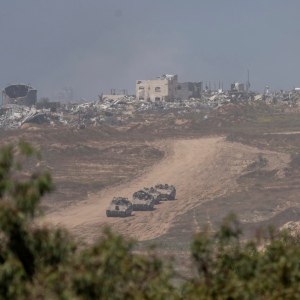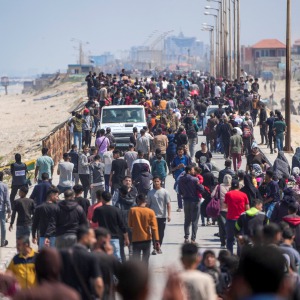Columnist Sara Weinberger: Hope and resilience in Syria
| Published: 03-19-2023 10:32 AM |
An NPR story about the Ethiopian conflict featured a woman imploring listeners to stay interested in this war that is claiming so many lives, acknowledging how difficult it is to focus on Ethiopia, given all the world crises competing for our attention. I thought about Syria, which recently marked 12 years since its president responded to Syrians’ demand for democracy, by launching a war on his people. Twelve years of barrel bombs toppling homes, hospitals, and schools, killing 300,000-plus people; of babies dying in besieged parts of Syria, their malnourished mothers feeding them sugar water instead of the breast milk their starving bodies can’t produce; of innocent people gassed; of human beings detained and disappeared inside military prisons, subjected to diabolical forms of torture; of more than 14 million Syrian refugees fleeing to countries who resent their presence; of a generation of children deprived of childhood; of almost seven million internally displaced people fleeing Northwest to Idlib Province, the last stronghold of Syrian resistance.
On Feb 6, those who already suffered unimaginable losses, who fled the Assad regime, Putin, ISIS, and Iran, were devastated by an earthquake that toppled whole communities, burying thousands. Syrians were again traumatized by death and destruction. That same earthquake wreaked havoc on two million Syrians who fled to Turkey, where families are exposed to the elements, sheltering in tarps and makeshift shelters.
Humanitarian assistance for Syria is controlled by the Assad regime, which means badly needed aid is prevented from reaching Northwest Syria, the largest opposition stronghold. Syrians are contending with a humanitarian nightmare. The pathetic response of the U.N., which waited an entire week after the earthquake to send aid through Turkey, was not surprising to Syrians, who are used to the Assad regime stealing, blocking deliveries, and selling humanitarian aid on the black market. And while international law deems it illegal to block humanitarian aid delivery, the U.N. obeyed Assad, preventing life-saving supplies and equipment from reaching millions in need.
We watched our televisions with relief and horror, as a Syrian baby was rescued, still connected by her umbilical cord to her dead mother. What we didn’t see were the more than 80 bombings committed by the regime, who wasted no time resuming attacks, in the aftermath of an earthquake that claimed 47,000 lives. It’s not surprising that the world has turned away from Syria. The enormity of suffering, the complexity of a war with so many diabolical players in a faraway country can paralyze us from taking action.
But there are those who are compelled to get involved by a belief in our shared humanity, such as the three young women I interviewed for this column. Natalie grew up in Hot Springs, Arkansas, where the only Syrians she knew were immigrants, MouazMoustafa and his brother, who played on her school’s soccer team. She eventually became a high school English, photography, and journalism teacher, reconnecting with Mouaz at a presentation he gave as the founder/director of The Syrian Emergency Task Force (SETF). Following his presentation, Natalie approached Mouaz. “Can we get cameras into Syria and see what they see?” Since then, she has tirelessly engaged her Arkansas community in adopting Wisdom House, a kindergarten for Syrian orphans. Natalie educates and organizes Arkansas high school and college students, faith-based communities, and legislators to write letters of hope, donate, and advocate for justice. She’s flown to Syria several times, bringing everything from socks to school supplies for the children she has fallen in love with.
Celine was born to Syrian parents, but never lived there. When her parents were unable to obtain asylum in the U.S., her family obtained citizenship in Canada. With a degree in political science, Celine moved to Washington, D.C., where she is one of four Syrians, who are members of the 15 member SETF team. Celine is amazed at how many non-Syrian co-workers and volunteers are so passionately committed to helping Syrians. In her words, “At this point, for anyone to still work on this is amazing.”
Vero was 13 in 2011 when the Syrian war started. As a teenager in her native Italy, moved by the plight of Syrian refugees, she “ … wanted to do something for people who weren’t fortunate enough to be born in the right country.” Inspired by a talk Mouaz and Natalie gave to her conflict resolution class at NYU, she began her stint with SETF as an intern, and continues to do policy and legal work, deriving meaning from photos of the Wisdom House children whom SETF has provided with a “ ...l ittle bit of something to look forward to … a chance to be kids.”
At a time when the future feels bleak to so many young people, Natalie, Celine, and Vero find meaning by doing for others. Natalie, wearing a pink T-shirt with multi-colored letters that reads, “Raise Kind Humans,” spoke eloquently: “The Syrian people are still resilient. They haven’t been broken yet. The people I work with give me hope, a cause that’s so much bigger than all of us.” Instead of turning her back on suffering, Natalie asks, “What can I do?”
Sara Weinberger of Easthampton is a professor emerita of social work and writes a monthly column. She can be reached at columnists@gazettenet.com.]]>Article continues after...
Yesterday's Most Read Articles

 Guest columnist Oriel Strong: Think impossible thoughts
Guest columnist Oriel Strong: Think impossible thoughts Guest columnist Barry Hirsch: Palestinians should turn to Israel for real path to peace
Guest columnist Barry Hirsch: Palestinians should turn to Israel for real path to peace Patricia Crosby: Meeting of Friends call for an immediate cease-fire in Gaza
Patricia Crosby: Meeting of Friends call for an immediate cease-fire in Gaza Columnist Richard Fein: National debt — A threat to our nation’s future
Columnist Richard Fein: National debt — A threat to our nation’s future
